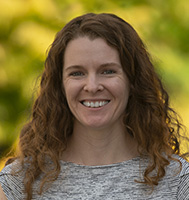Q&A with Claire O’Leary, PhD, assistant professor, Division of Allergy, Immunology, and Rheumatology, and the O’Leary Research Group
 Hometown: St Paul, Minnesota
Hometown: St Paul, Minnesota
Educational/professional background: I earned my BA in Molecular Biology (honors) and Spanish from UW–Madison in 2009 and my PhD in Biomedical Sciences – Cell and Molecular Biology from the University of Pennsylvania in 2015.
Previous position (title, institution): Postdoctoral fellow, University of California, San Francisco
How would you describe your work to a 5-year-old? We eat and drink all sorts of things to give us energy and help us grow. When our bodies get the energy out of our food we call it digestion, and it happens in the gut. The process of breaking down food is pretty intense! But somehow we break down only our food without hurting our body. I am studying how the body effectively digests food without hurting itself.
How did you get into your field of research or area of clinical care? I did my PhD in T cell immunology, but loved attending talks and seminars on how immune cells behave and act in tissues exposed to nutrients and the microbiome. I chose my postdoc position in Rich Locksley’s lab to study rare cells, called tuft cells, which are found in the linings of many organs and seem to regulate immune responses to environmental exposures. I am continuing to study tuft cells in my own lab.
What attracted you to UW–Madison? The diverse research community, expertise in many scientific fields, commitment to mentorship, and graduate education. Plus, I have family here!
What is your favorite thing to do in Madison? Be outside!
What’s one thing you hope trainees will learn from you and your work? How to think critically and learn from failures and unexpected results.
Do you feel your work relates to the Wisconsin Idea? If so, please describe how. I think all basic science research embodies the Wisconsin Idea, particularly in graduate and medical education. The focus on learning the scientific process, thinking critically, and applying your skills in new areas creates well-rounded scientific citizens who are able to take this way of thinking on to their next challenge.
What’s something interesting about your area of expertise you can share that will make us sound smarter during video chats and parties? You have more cells in your microbiome (single cell bacteria, multicellular protists, and fungi) than you have human cells, but it only adds up to about a pound of mass.
What are some of your hobbies and other interests? Running, drinking coffee, and eating donuts.